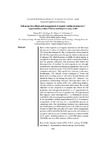| dc.description.abstract | Rates of decomposition of organic materials in soil determine
the amount of carbon (C) which is mineralized and released as
CO2 versus the amount of C that is retained in various forms in
the soil. Decomposition rates also greatly influence the amount
of nitrogen (N) which becomes available for plant uptake or
susceptible to leaching versus that which is retained in SOM or
lost via gaseous emission. The processes that follow the
decomposition of residues by microorganisms are strongly
influenced by soil chemical and physical properties, and also by
plant roots via the processes of mineral N uptake, respiration,
exudation and decay. The equilibrium between carbonates,
bicarbonates, CO2
and pH controls inorganic C losses and
deposition over large areas of arid and semi arid climates and
should be linked to the biological cycle of C. However, few
quantitative relationships between decomposition rates of
organic manures & wastes (OW) and controlling edaphic,
climatic and biotic variables have been determined. The overall
objective of this proposal is to explore the effects of soil
properties and management practices on C sequestration in
soils, off-site losses of N and crop productivity. We hypothesized
that organic waste decomposition is a biological process
controlled by the microorganism population and it is not affected
by soil properties, and that sequestration of CO2
-C by inorganic
components of the soil may be a considerable process in
calcareous soils. The methodology includes the simultaneous
use of laboratory and field experiments with stable isotopes of
N and C to follow the dynamics of N and C. Best management
practices will be identified by field experiments and simulation
scenarios with the process oriented computer simulation models
of N and C transformations in a soil-OW-plant system
(NCSOIL) and two MSc students will be trained. | en_US |

